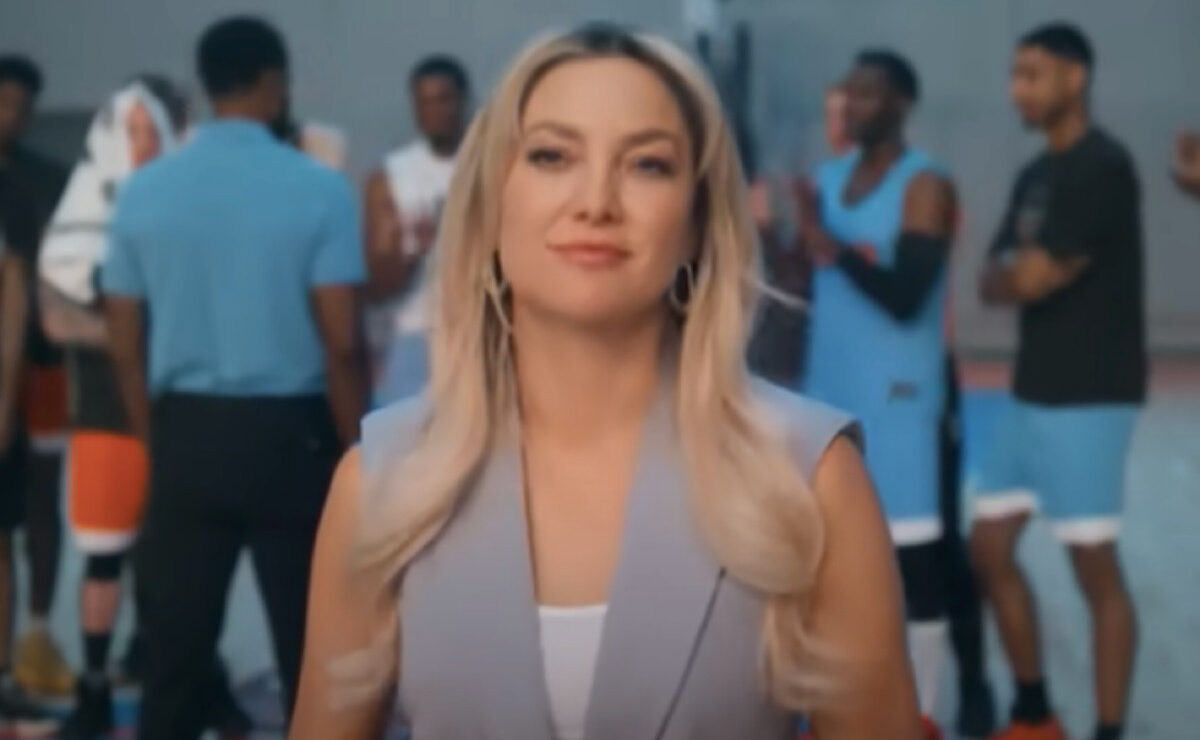
Kate Hudson as Isla Gordon in “Running Point.” Image: Netflix
Let’s keep it real, the hook of “Running Point” is that it’s loosely based on the life and career of Jeanie Buss, the owner and president of the Los Angeles Lakers. Even more interesting, Buss serves as one of the executive producers of the latest workplace comedy from actor and screenwriter, Mindy Kaling. The blurred lines between fact and fiction add dimension to a promising series that is still finding its heart and soul. In sports terms, “Running Point” is a rookie with a solid foundation and a decent ceiling for improvement.
Most people describe “Running Point” as a cross between “Succession” and “Ted Lasso,” which to me sounds like if Paddington Bear eats marmalade sandwiches spiked with ripe Ghost peppers. But it makes sense since it’s about a struggling basketball team managed by bickering siblings. The first episode introduces us to the Gordons: Cam, the eldest brother and previous president of the Waves; Ness, the other older brother, former professional player, and general team manager; Sandy, the half-brother and chief financial officer; and Isla, the reformed party girl and coordinator of charitable endeavors. There is one more Gordon, but we will not spoil an entire plot point dedicated to his character. Out of the four, Isla understands the nuts and bolts of the Waves, but her late father saw her as “just the princess” and not a viable heir to the throne. Fate has other plans as Cam stepped down from his position after, uhm, an accident. To the surprise of his brothers, he appointed Isla to take over. Except for her bestie, everyone doubted her abilities to oversee “the greatest basketball franchise in the history of the game.”
One of the most essential elements of a workplace comedy is a relatable story. Most sports series and films focus on the athletes and not the people inside the boardroom because it’s difficult to relate to multi-millionaires in suits. But “Running Point” is not “most sports stories.” Despite the stressful demands of professional sports operations, Jeanie Buss keeps motion outside the basketball court. “Running Point” is her fourth project as a producer and the second one that expands the Lakers brand. Like the series, Buss is also not like most professional team owners. She has survived publicized team ownership disputes and failed relationships, and, three decades later, people still ask her about her decision to pose for a popular men’s publication.
Kate Hudson, with her inherent charm and remarkable comedic chops, could not be a more perfect choice to take on the role of Isla Gordon — the fictionalized Jeanie Buss. Her performance in the second episode, “Joe Pesci,” is a splendid encapsulation of her cheerful California blonde with a ruthless streak character. Halfway through the ten-episode series, I wondered if Isla would end up as the archetypal girlboss or simply a boss who happens to be a girl. “Girlboss” has lost favor since its popularization as feminist critics points out that boss babes tend to assume the traditional roles and practices of men instead of dismantling the inequalities borne out of patriarchy and capitalism. There is a reason the concept is associated with the pejorative phrase “girlboss, gaslight, gatekeep,” and not with “women empowerment.” So far, Isla Gordon is seen as a firm but kind leader, who barely keeps a balanced personal and professional life.
The rest of the characters fall under the workplace comedy archetypes. One of the elder brothers, Ness, is a chaotic adult child. The half-brother is the voice of reason until we witness his disastrous love life. The coach seems like the actual voice of reason until we also witness his disastrous love life. I wondered if his character would sort of reflect real life, and oh, it did. (Just search “Jeanie Buss” and “Phil Jackson.”) Chet Hanks, the son of Tom, is the problematic baller Travis who raps on the side. He is the snark who causes needless problems for the team. In one episode, we are introduced to his incredible piece of work of a mother Bonnie. No doubt, she is the best guest in the entire series. I want to see more of her. Of all the characters, I was disappointed with the best friend of Isla. I wished she had a more prominent role because one of the best assets of a female trailblazer is a dependable female confidante.
While “Running Point” is a blithe workplace series, it sometimes borders on satire. I hope the second season explores the various issues unique to modern professional sports, such as labor disputes, contracts and salaries, traditional and social media, and more. Professional basketball provides endless sources of humor and conflicts: rookie drafts, surprise trades, reckless podcast interviews, and social media drama. With a capable cast and dependable writers, “Running Point” has the proper tools to improve its sophomore season. We are at an inflection point in women’s sports and women in sports, and the series is in a unique position to deliver, not just entertainment, but substance.

